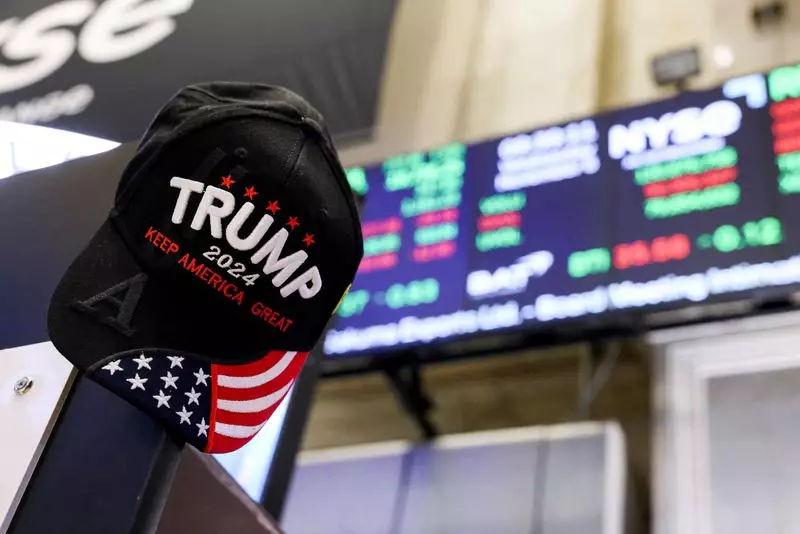The nomination of Scott Bessent as Treasury Secretary by President-elect Donald Trump marks a significant turning point for the U.S. financial landscape, especially concerning the government bond market. This role is vital not only for shaping economic policy but also for instilling confidence among investors who have expressed increasing anxiety about potential inflation and a ballooning federal budget deficit, resulting from Trump’s proposed economic strategies. By analyzing the implications of this nomination, we can better understand the potential ramifications for government bond yields and overall economic health.
In the weeks leading up to Bessent’s nomination, the U.S. government bond market faced considerable tension and a notable selloff, primarily fueled by fears regarding inflation and the effects of Trump’s fiscal policies. With the benchmark 10-year yield approaching levels not seen in five months, investor sentiment appeared strained. Uncertainty over the identity of the next Treasury Secretary exacerbated this atmosphere, as market participants sought assurance that the incoming administration would maintain fiscal prudence and avoid overly aggressive trade policies.
Extensive speculation surrounded the selection of the new Treasury Secretary, causing anxiety among investors who were concerned that Trump might choose someone who could exacerbate fears of economic isolationism. The market was wary of a nominee perceived as overly protective and radical regarding trade, particularly at a time when economic stability was paramount.
Scott Bessent, a well-regarded investor with a reputation for fiscal conservatism, has the potential to address investor anxieties constructively. His background suggests a nuanced understanding of market dynamics, being versed in both regulatory frameworks and economic strategies. Bessent’s advocacy for tax reform and deregulation, particularly aimed at promoting bank lending and energy production, aligns well with the market’s desire for a rational and growth-oriented economic approach.
His appointment signals a departure from the more isolationist instincts that have recently dominated discussions surrounding U.S. trade policy. Investors like Michael Purves of Tallbacken Capital Advisors view Bessent’s nomination positively, as it provides a measure of reassurance and optimism that the new Treasury Secretary will foster a more balanced and market-friendly environment.
Bessent’s imminent role as Treasury Secretary puts him at a critical juncture where he must navigate the complexities of trade policies and fiscal challenges. The markets are particularly focused on the administration’s approach to tariffs, especially with Trump previously suggesting substantial tariffs on imports. Economic experts like Christopher Hodge from Natixis have expressed hope that Bessent can mitigate the risks associated with extreme tariff measures, emphasizing the importance of a Treasury Secretary who can communicate potential repercussions to the administration effectively.
Moreover, Bessent’s tenure will also involve managing the intricate landscape of U.S. government debt. Investors are acutely aware of the pressures that could arise from increased borrowing or deficits, especially if economic outcomes do not align with optimistic projections. His capacity to uphold fiscal discipline while advancing Trump’s overarching economic agenda will be critical for maintaining investor trust and stabilizing the bond market.
An additional layer of complexity surrounding Bessent’s appointment surrounds the Federal Reserve’s independence. Trump’s previous comments suggesting that the president should have a say in Fed decisions have raised concerns among investors and economic analysts alike. There is a widespread belief that maintaining the Federal Reserve’s autonomy is vital for long-term economic stability, and the new Treasury Secretary must advocate for this independence to bolster confidence in the bond market.
A collaborative approach between the Treasury and the Fed could help craft a coherent monetary policy, reassuring investors that actions will be guided by economic fundamentals rather than political expediency. As Bessent steps into the pivotal role, stakeholders will closely monitor how he addresses these challenges, further shaping the economic landscape.
Scott Bessent’s nomination as Treasury Secretary may just be the remedy the troubled bond market needs. With his fiscal conservatism and market-savvy insights, Bessent has the potential to restore investor confidence in the U.S. financial system. However, the coming months will be telling, as Bessent navigates trade policies, fiscal responsibility, and the intricate relationship with the Federal Reserve. The stakes are high, and how he balances these competing interests could set the tone for the U.S. economy in the era of Trump. Ultimately, the success of his appointment will depend on his ability to instill a sense of stability and control over the economic narratives that currently define the bond market.

